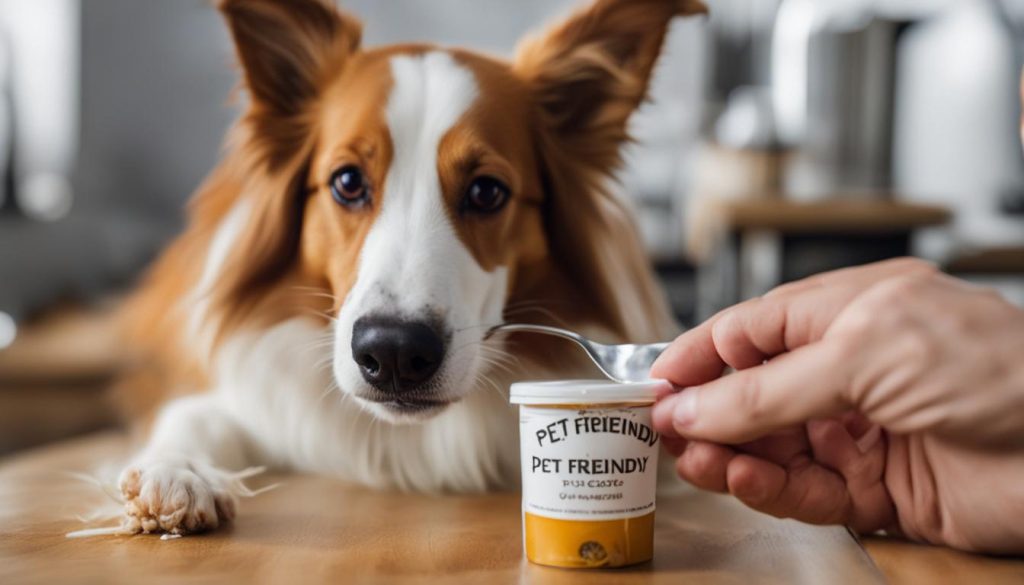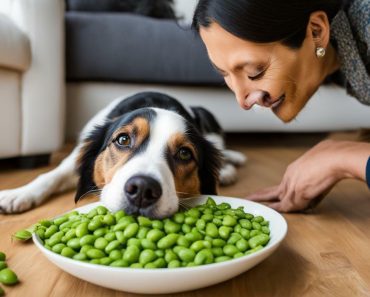When it comes to our furry companions, their health and well-being are always a top priority. We strive to provide them with the best care, including a balanced and nutritious diet. However, it’s important to be aware of what foods are safe and suitable for our dogs to consume. One common question that often arises is: can dogs eat sour cream? Is it safe?
The answer to this question is not a straightforward yes or no. There are several factors to consider when it comes to feeding sour cream to our dogs. While sour cream is not toxic to dogs, it is not recommended as a regular part of their diet. Here’s why:
Lactose Content: Sour cream, like other dairy products, contains lactose. Dogs have difficulty digesting lactose, the sugar present in milk and dairy products. Feeding sour cream to dogs can lead to digestive upset, such as diarrhea, vomiting, and gas.
High Fat Content: Sour cream is also high in fat, which can be problematic for our furry friends. Excessive consumption of high-fat foods can lead to weight gain and obesity in dogs, which can increase the risk of various health issues.
Allergies and Sensitivities: Some dogs may have allergies or sensitivities to dairy products like sour cream. This can result in allergic reactions, such as itching, skin irritations, or gastrointestinal discomfort.
Considering these factors, it is best to err on the side of caution and avoid feeding sour cream to our dogs. However, if you’re looking to add flavor and texture to your dog’s meals, there are healthier alternatives available.
Can Dogs Eat Sour Cream? Yes, but not recommended.
- Sour cream is not recommended for dogs due to its lactose content, which can cause digestive upset.
- The high-fat content in sour cream can contribute to weight gain and obesity in dogs.
- Some dogs may have allergies or sensitivities to dairy products like sour cream.
- Healthier alternatives to sour cream include plain yogurt, cottage cheese, pumpkin puree, and mashed sweet potatoes.
- Consult with a veterinarian before introducing any new food to your dog’s diet.
Is Sour Cream Safe for Dogs to Eat?
Sour cream is not recommended for dogs due to its high fat and lactose content.
Dogs have difficulty digesting lactose, the sugar present in milk and dairy products, including sour cream. This can lead to digestive upset, such as diarrhea, vomiting, and gas.
Additionally, some sour creams may contain harmful additives or seasonings, such as garlic or onion, which can be toxic to dogs.
While a small amount of sour cream might not cause severe harm, it is best to avoid feeding sour cream to dogs to prevent potential health risks.
If you want to add flavor or texture to your dog’s meals, consider safer alternatives like plain, unsweetened yogurt, which is easier on their stomachs and provides probiotics for digestion.

Potential Risks and Side Effects of Dogs Consuming Sour Cream
Dogs consuming sour cream can experience several potential risks and side effects. Firstly, the high fat content in sour cream can contribute to weight gain and obesity in dogs, which can lead to various health problems.
Obesity in dogs can increase the risk of heart disease, diabetes, and joint issues, causing pain and limiting their mobility.
Additionally, some dogs may have allergies or sensitivities to dairy products like sour cream, resulting in allergic reactions or skin irritations. These allergic reactions can manifest as itching, redness, swelling, hives, or even more severe symptoms like difficulty breathing or anaphylactic shock.
It is important to observe your dog closely for any signs of an allergic reaction if they consume sour cream.
Digestive issues are also common side effects of feeding sour cream to dogs. Dogs have difficulty digesting the lactose in dairy products, including sour cream. This can lead to an upset stomach, diarrhea, vomiting, and gas.
These digestive issues can cause discomfort and dehydration in dogs, and if left untreated, can lead to more serious health complications.
The rich and fatty nature of sour cream can also increase the risk of pancreatitis in dogs. Pancreatitis is an inflammatory disease that affects the pancreas and can be extremely painful for dogs. The symptoms of pancreatitis include loss of appetite, vomiting, diarrhea, abdominal pain, and lethargy.
In severe cases, pancreatitis can be life-threatening and requires immediate veterinary care.
It is crucial to be aware of these potential risks and side effects before considering feeding sour cream to your dog. While it may be tempting to share your favorite foods with your furry companion, it is important to prioritize their health and well-being.
If you suspect that your dog has consumed sour cream or is experiencing any of these symptoms after consuming dairy products, it is recommended to consult with a veterinarian for proper diagnosis and treatment.
Alternatives to Sour Cream for Dogs
Instead of feeding sour cream to dogs, there are several alternatives that can provide similar flavors and textures without the potential risks.
- Plain, unsweetened yogurt: Yogurt is a safe and healthy substitute for sour cream, as it contains probiotics that support digestion. Dogs can enjoy plain, unsweetened yogurt as a tasty and nutritious alternative.
- Cottage cheese: Another option is cottage cheese, which is a good source of protein for dogs. It can be added to their meals for a creamy texture and added nutrition.
- Pumpkin puree: Made from plain, canned pumpkin, pumpkin puree is low in calories and high in fiber, making it a nutritious alternative to sour cream. Dogs tend to enjoy the taste of pumpkin, and it can be mixed into their meals for added flavor and texture.
- Mashed sweet potatoes: Dogs generally enjoy the taste of sweet potatoes, and they can be a tasty and nutritious alternative to sour cream. Simply boil or bake sweet potatoes, mash them up, and mix them into your dog’s meals.
When using these alternatives, it’s important to avoid adding any harmful seasonings or additives. Introduce them gradually into your dog’s diet to ensure they tolerate them well.

Conclusion
While sour cream is not toxic to dogs, it is not recommended as a regular part of their diet. Dogs have difficulty digesting the lactose and high fat content in sour cream, which can lead to digestive upset, weight gain, and other health issues.
Instead, it is best to avoid feeding sour cream to dogs and opt for healthier alternatives such as plain yogurt or cottage cheese. These alternatives provide similar flavors and textures without the potential risks associated with sour cream.
If you have any concerns or questions about specific foods for your dog, it is always advisable to consult with a veterinarian for personalized advice and guidance. Prioritizing a balanced and nutritious diet that meets your dog’s specific nutritional needs is crucial for their overall health and well-being.






